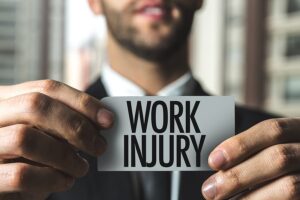What is Considered a Personal Injury Lawsuit?
When another party's negligence or careless actions injure someone, they may pursue a personal injury lawsuit. The goal of these lawsuits is to win a settlement and hold the negligent party responsible for their actions.
Personal injury lawsuits are filed in civil court and are separate from any criminal court proceedings that may arise from the accident or injury. Most people are familiar with car accident lawsuits and workers’ compensation cases, but there are several other types of personal injury lawsuits. Read on to learn more about personal injury lawsuits. if you Suspect your injury accident may be eligible to file a claim then speak to an experienced personal injury lawyer today.
Types of personal injury lawsuits
Listed below are some of the most common types of personal injury lawsuits filed in the U.S. Personal injury lawyers are uniquely qualified to help victims pursue justice in these cases.
Motor vehicle crashes

The Centers for Disease Control and Prevention (CDC) reported that in one recent year, over 2.5 million people went to the ER after motor vehicle crashes. These injuries result in not just medical bills but missed work, property damage, and emotional distress.
Motor vehicle accidents that involve any of these parties can quickly become complex:
- Car accidents
- Uber, Lyft, or another rideshare driver
- Commercial trucking company
- Uninsured driver
- Pedestrian accidents
- Bicycle accidents
- Motorcycle accidents
- A municipality, if damaged roads or malfunctioning traffic lights caused the accident
- Three or more motor vehicles
Damage or lack of damage to a vehicle does not necessarily indicate how badly the accident injured the occupants. Soft tissue injuries, sprains, and concussions can occur even in slow-speed "fender benders."
Slip and fall accidents
Property owners must keep their premises safe. In many circumstances, this responsibility extends not just to businesses and public spaces but also privately owned property. In the legal world, a slip and fall accident is sometimes called a premises liability case.
Property owners can be held responsible for injuries in these situations:
- A customer trips over boxes of inventory left on a store floor and hits their head.
- A guest at a private home stumbles on a broken stair and breaks their foot.
- A hotel guest nearly drowns when the swimming pool ladder breaks when they enter the pool.
- A pedestrian trips on a broken sidewalk and sustains a back injury.
Note that "slip and fall" is the common name for these cases, but actions other than slipping or falling can injure people.
Workplace injuries

Some occupations are inherently more dangerous than others. But an injury can happen in any work environment, even an office setting. When employers fail to abide by OSHA guidelines and industry standards, accidents can happen.
Some of the workplace injury cases that an attorney can help with include:
- Repetitive motion injuries
- Falls on wet or oily floors
- Muscle strains and exertion
- Hand and finger amputations caused by faulty equipment or a lack of safety measures
- Falls from high distances
- Being struck by falling objects
State laws require most employers to carry workers' compensation insurance. However, some violate the law and don't. And workers' compensation does not cover some jurisdictions or certain occupations like domestic workers and farmworkers.
Dog bites and attacks
While dogs are beloved family pets, they are also animals who can exhibit unpredictable behavior. Any dog can bite if they perceive someone or something as a threat.
Many dog bites and attacks happen in the course of everyday activities. For example, dogs injured more than 5,800 postal employees in a recent year, according to the United States Postal Service (USPS).
Most jurisdictions agree that a dog owner is responsible for their pet’s behavior. However, the laws regarding dog bites and personal injury claims vary from state to state.
Nursing home abuse
For many families, the decision to place their loved ones in a nursing home is a difficult one. When seniors can no longer care for themselves, they depend on others for everyday tasks. Unfortunately, this vulnerability can make nursing home residents the victim of abuse.
Nursing home abuse can be difficult to uncover without an attorney. The facility may explain that signs of abuse are a natural part of aging or that the individual is hurt. Nursing home abuse includes physical abuse and emotional, sexual, and financial abuse.
Medical malpractice

When patients seek medical care, there isn’t always a favorable outcome. The difference between unavoidable disease or injury progression and medical malpractice is whether the treatment met a standard of care.
When determining whether a standard of care was met, the law asks, “Did the doctor provide treatment that another doctor with the same education and experience would provide under similar circumstances?”
Medical malpractice can encompass:
- Preventable mistakes
- Mismanagement of anesthesia medications
- Surgical errors, such as an instrument left in the body or the wrong body part operated on
- Failure to diagnose/Misdiagnosis
- Birth injuries
- Prescription medication errors
- Prescribing a contraindicated drug
- Prescribing a dose that is too high and causes adverse side effects, or too low and causes a condition to progress
Some patients discover that they were the victim of medical malpractice sometime after it occurred. In many jurisdictions, the statute of limitations for medical malpractice starts when the patient is made aware of possible medical malpractice.
Wrongful death
If a loved one died due to any of the personal injuries listed above, survivors might be able to pursue a wrongful death lawsuit.
They could recover a settlement to compensate them for:
- Medical care that their loved ones received for their fatal injuries
- Reasonable funeral, cremation, and burial expenses
- Any income that the deceased would have earned had they survived
- Pain and suffering that their loved one experienced before their death
- Loss of companionship for the surviving spouse
- Loss of guidance for minor children
The deceased’s spouse, children, and parents can file a wrongful death claim in most states. There may be other circumstances where another relative or representative of the estate can do so.
Does a personal injury lawsuit always end in a court trial?
No. Many personal injury lawsuits successfully settle without stepping foot in a courtroom.
A court trial is full of uncertainties for both parties. It is difficult to predict how a jury of randomly selected individuals or judges will react to any personal injury case.
Many people worry about a possible trial because of how they’ve seen trials portrayed on TV shows and movies. In real life, a courtroom is not nearly as dramatic. When a case does go to trial, an attorney makes sure that their client feels ready and is comfortable with the process.
What does a personal injury settlement pay for?
A settlement compensates the injured party or their surviving family members for any accident-related damages. These damages are either economic or non-economic.
Economic or special damages
A personal injury case can quickly become expensive. Damages with a set price tag associated with them are economic or special damages.
Examples of monetary damages that can stem from a personal injury are:
- Current and future medical expenses
- ER visit and an ambulance ride
- Doctor appointments
- Ongoing physical, occupational, or speech therapy
- Hospitalizations
- Surgery
- Diagnostic tests
- Prescription drugs
- Medical equipment such as a wheelchair, walker, or other mobility aid
- Counseling
- Property damage
- Vehicle repairs
- Any other personal property that was damaged or destroyed as a result of the accident
- Lost income and diminished earning capacity
- Cost of hiring assistance for tasks the injured party can no longer perform, childcare and housekeeping
It doesn’t take long for these costs to become insurmountable. No one should face an uncertain future after a personal injury.
Non-economic or general damages
General damages are also called non-economic because they do not have a set cost and include:
- Physical pain and suffering
- Emotional distress
- Permanent disfigurement or scarring
- Loss of companionship for the surviving spouse in a wrongful death lawsuit
- Loss of guidance for any minor children in wrongful death
While a settlement can’t undo the impact of a personal injury, it can provide a sense of closure. Also, the responsible party is held accountable when they have to pay for non-economic damages.
Time limits to file a personal injury lawsuit
Each state sets its statute of limitations for personal injury lawsuits.
Injured parties should know:
- The statute of limitations—or time limit to file a case—can vary depending on the nature of the injury. For example, a state may have one time limit for medical malpractice cases and another time limit for all other personal injury cases.
- Typically, the clock starts to tick on the day the injury occurred.
Certain exceptions may apply to a state’s statute of limitations.
Possible statute of limitations exceptions
An injury may not immediately appear to qualify for a personal injury lawsuit. For example, a worker may develop cancer years after working with a dangerous substance. Or, a patient can learn about a misdiagnosis well after it happens. In these instances, the state’s statute of limitations may start the day that the injured party or surviving family members discovered the nature of the personal injury.
And when a child experiences a personal injury, their parents or legal guardians can file a lawsuit on their behalf. If for some reason the parents never filed a legal claim, in some instances, a person may file a claim after they turn 18.
Anyone who has questions about the statute of limitations should speak with an attorney.
After an accident or injury, don’t wait to seek legal representation
Most personal injury law firms offer a free consultation. It costs nothing but a few minutes of one’s time to learn if they have a legal case.
Injured parties and their families don’t have to know all the facts before reaching out to a lawyer. Some personal injury cases will require an investigation, which a law firm has the resources and staffing to conduct.
Anyone who waits to contact an attorney risks missing the deadline to file a lawsuit. Once the statute of limitations is up, you may not be eligible for compensation.
3 Things NOT to do after a personal injury
1. Don’t delay medical treatment
The injured person’s immediate health and well-being come first. Don’t wait to see a doctor, even if the injury seems minor or they think a home remedy will be sufficient.
If an injured party waits too long to see a doctor, the insurance company could claim that they aren’t that hurt. Or, the insurance company will question if the accident caused the injury or if another incident did.
2. Don’t accept the insurance company’s first offer
An ambulance ride and ER visit may only be the start of expenses. A personal injury settlement is meant to cover damages that are incurred today and ten years down the road. What seems like a generous insurance payout may not be.
When personal injury law firms calculate an appropriate settlement amount, they may consult with economic, occupational, and medical experts. Once the injured individual accepts a settlement, they typically forfeit the right to sue for more money in the future. After a personal injury or wrongful death, claimants may have one chance to pursue the money they deserve.
3. Don’t discuss the injury on social media
Claimants in a personal injury lawsuit should avoid public statements about their case. The other party can misconstrue even innocuous photos and social media posts. Anyone involved in a personal injury lawsuit should consult with their attorney before making public statements about their injuries.
How to choose the right personal injury attorney

A Google search for "Find a personal injury lawyer near me" will produce many results. There is no shortage of personal injury law firms, but not all can take on every type of case. Before hiring an attorney, injured parties and their families should consider these questions.
- How much are your attorney fees, and when are they due?
- What will I owe if I lose my case?
- How many similar cases have you handled?
- How will we communicate about my case?
Injured parties should answer these questions before hiring an attorney to represent them.
